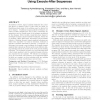Free Online Productivity Tools
i2Speak
i2Symbol
i2OCR
iTex2Img
iWeb2Print
iWeb2Shot
i2Type
iPdf2Split
iPdf2Merge
i2Bopomofo
i2Arabic
i2Style
i2Image
i2PDF
iLatex2Rtf
Sci2ools
ICSE
2005
IEEE-ACM
2005
IEEE-ACM
Efficient and precise dynamic impact analysis using execute-after sequences
As software evolves, impact analysis estimates the potential effects of changes, before or after they are made, by identifying which parts of the software may be affected by such changes. Traditional impact-analysis techniques are based on static analysis and, due to their conservative assumptions, tend to identify most of the software as affected by the changes. More recently, researchers have begun to investigate dynamic impact-analysis techniques, which rely on dynamic, rather than static, information about software behavior. Existing dynamic impact-analysis techniques are either very expensive--in terms of execution overhead or amount of dynamic information collected--or imprecise. In this paper, we present a new technique for dynamic impact analysis that is almost as efficient as the most efficient existing technique and is as precise as the most precise existing technique. The technique is based on a novel algorithm that collects (and analyzes) only the essential dynamic informa...
Dynamic Impact-analysis Techniques | Efficient Existing Technique | ICSE 2005 | Precise Existing Technique | Software Engineering |
Related Content
| Added | 09 Dec 2009 |
| Updated | 09 Dec 2009 |
| Type | Conference |
| Year | 2005 |
| Where | ICSE |
| Authors | Taweesup Apiwattanapong, Alessandro Orso, Mary Jean Harrold |
Comments (0)

